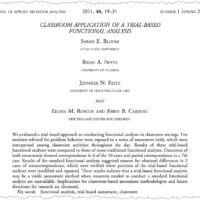Programming Maintenance in Token Economies: Procedural Strategies and Ethical Implications
$20.00
BCBA CEUs: 1 Total CEU | 1 Ethics CEU
Token economies are widely used interventions that reward desired behaviors with tokens exchangeable for preferred items or privileges, with applications ranging from psychiatric facilities to classrooms. Gradual removal of token economies is crucial for fostering independence, with maintenance procedures including thinning, fading, transfer of control, and combinations of strategies, each with its ethical considerations and effectiveness. This presentation from the 2023 Michigan Autism Conference aims to educate learners on implementing these maintenance procedures, their benefits and drawbacks, and future research directions.
Brand: CEUniverse
Description
Token economies are interventions that rely on the provision of token reinforcers contingent upon a target behavior and involve reinforcing desirable behavior with tokens that can be later exchanged for preferred items, privileges, and activities, called “backup reinforcers.” Token economies have a long history of clinical application, including modifying the behavior of individuals with mental illnesses in psychiatric facilities, increasing attendance and task completion with children in juvenile court, and promoting classroom participation. Token economies are easily disseminated and typically potent interventions. One critically important step in the implementation process is the gradual remove of a token economy, which is required for successful discharge of a patient, and to promote their independence. Four categories of maintenance procedures will be discussed in this presentation: (1) thinning; (2) fading; (3) transfer of control; and (4) combinations of maintenance strategies. By the end of this video, learners should understand the ethical implications of promoting maintenance, strategies for implementing these procedures, the benefits and drawbacks of each procedure, and future directions of research in this area.
About the Speaker
Dr. Sean Regnier is a Post-Doctoral Fellow at the University of Kentucky College of Medicine. He holds a Ph.D. in Applied Behavior Analysis from Western Michigan University, an MA in Applied Behavior Analysis from Westfield State University, and a BA in Psychology from Westfield State University. His skills and expertise include behavioral psychology, treatment, mental illness, behavioral pharmacology, and intellectual disabilities.
Free Preview
Below is the entire open-access version of this video. It does not contain embedded questions or interactions like the CEU version of the module.
3 reviews for Programming Maintenance in Token Economies: Procedural Strategies and Ethical Implications
Sorry, no reviews match your current selections
You may also like…
-
Multimedia Tutorial

1 Total BCBA CEU
1 Ethics CEUABA Terminology for Effective Practice
Melissa Mackal & Robert Wallander4.60 out of 5(30)$10.00 Add to Cart -
Multimedia Tutorial

7 BCBA CEUs
An Introduction to Relational Frame Theory (RFT)
Eric J. Fox4.55 out of 5(493)$70.00 Add to Cart -
Interactive Video

1.5 BCBA CEUs
B.F. Skinner on Education
B.F. Skinner4.96 out of 5(23)$15.00 Add to Cart -
Article Quiz

1 BCBA CEU
Classroom Application of a Trial-Based Functional Analysis
Sarah E. Bloom, Brian A. Iwata, Jennifer N. Fritz, Eileen M. Roscoe, & Abbey B. Carreau4.71 out of 5(24)$10.00 Add to Cart
Related products
-
Interactive Video

1 BCBA CEU
Essential Competencies for Practitioners Working with Children Diagnosed with Autism
Mary Jane Weiss3.67 out of 5(3)$20.00 Add to Cart -
Interactive Video

1 BCBA CEU
Navigating Higher Education with ASD
Chaturi Edrisinha$20.00 Add to Cart -
Interactive Video

1 BCBA CEU
Problem Behavior is Predictable and Preventable
Timothy Vollmer4.95 out of 5(20)$20.00 Add to Cart -
Interactive Video

1 Total BCBA CEU
1 Ethics CEUDetecting and Troubleshooting Treatment Failures: A Crucial Component of Evidence-Based Practice of ABA
Wayne Fuqua4.31 out of 5(13)$20.00 Add to Cart






Token economies are so often used in practice- this was very helpful
Helpful strategies and information on the implementation of token economies! The audio was at times hard to hear but overall it was a great presentation.
Good review and new perspectives on token economies across various settings